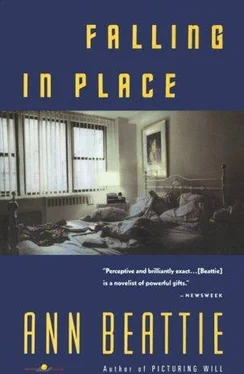Ann Beattie - Falling in Place
Здесь есть возможность читать онлайн «Ann Beattie - Falling in Place» весь текст электронной книги совершенно бесплатно (целиком полную версию без сокращений). В некоторых случаях можно слушать аудио, скачать через торрент в формате fb2 и присутствует краткое содержание. Год выпуска: 1991, Издательство: Vintage, Жанр: Современная проза, на английском языке. Описание произведения, (предисловие) а так же отзывы посетителей доступны на портале библиотеки ЛибКат.
- Название:Falling in Place
- Автор:
- Издательство:Vintage
- Жанр:
- Год:1991
- ISBN:нет данных
- Рейтинг книги:4 / 5. Голосов: 1
-
Избранное:Добавить в избранное
- Отзывы:
-
Ваша оценка:
- 80
- 1
- 2
- 3
- 4
- 5
Falling in Place: краткое содержание, описание и аннотация
Предлагаем к чтению аннотацию, описание, краткое содержание или предисловие (зависит от того, что написал сам автор книги «Falling in Place»). Если вы не нашли необходимую информацию о книге — напишите в комментариях, мы постараемся отыскать её.
Falling in Place — читать онлайн бесплатно полную книгу (весь текст) целиком
Ниже представлен текст книги, разбитый по страницам. Система сохранения места последней прочитанной страницы, позволяет с удобством читать онлайн бесплатно книгу «Falling in Place», без необходимости каждый раз заново искать на чём Вы остановились. Поставьте закладку, и сможете в любой момент перейти на страницу, на которой закончили чтение.
Интервал:
Закладка:
“He loves to work. Sal loves to work,” Robby said.
“Make fun of me,” Sal said. “I like to work. I like heat. That’s it. I thought this was where I’d end up. Sure. What started this, anyway?” Sal said. “Are you cooking today or not?”
“What does it look like I’m doing? Discoing?”
Robby turned back to the grill. Sal wiped his hands on a towel under the counter.
“Maybe there’s something better to do than go across the street,” Parker said.
“It was your idea. I don’t even want to go.”
“Let’s go,” Parker said. “It’s right across the street, I guess.” He squirted a blob of ketchup on the side of the plate. The plate was shiny with grease. He ran the French fry through the grease and salt to the ketchup, pushed it around, and picked it up in his fingers.
“My one grandmother doesn’t send me money because she’s dead,” Parker said. “The one that’s alive sends me stuff, but not money.”
“When did she die?”
“Last summer. Swimming in the Adirondacks. She had a stroke or something.”
“I never thought about a grandmother swimming,” John Joel said.
“What’s yours do?”
“She doesn’t do anything. She takes my brother and the dog to the park sometimes, I think. She reads books.”
“My grandmother had the Kinsey Report on her bookshelf in the kitchen with her cookbooks. It was boring. Just a lot of crap.”
“What’d she keep it there for?”
“Adults don’t think they have to hide anything,” Parker said. “No. I take it back. My father hides things. But nothing as stupid as the Kinsey Report.”
“What does he hide?”
“He’s got pictures hidden. He’s got a dirty deck of cards. I opened what I thought was his fishing box, and it was full of stuff like that. Maybe it isn’t even his. When my grandmother died and my grandfather went into a nursing home he hauled home all kinds of crap. I don’t even think the stuff is his, come to think of it.”
“What did you think when you found it?”
“You sound like my shrink,” Parker said. “Would I have to beg for a milkshake?”
“They’re a dollar ten.”
“Will it do me any good to beg for a milkshake?” Parker had torn two matches out of the book. He pushed them toward each other, head to head.
“Okay. Tell the guy we want two.”
“Garçon,” Parker said to Sal. “Two chocolate milkshakes, please.”
“I was in Paris in World War II,” Sal said. “Give me a sentence in French and I can answer you. Go ahead.”
“I don’t know French.”
“You sounded like you did there, for a minute. What kind of milkshakes?”
“Chocolate,” John Joel said.
“Chocolate malt,” Parker said.
“My brother was in the Philippines,” the counterman said. “Used to get the monkeys drunk as skunks. Leave beer in the cans. Monkeys would swing around, loaded, fall out of the trees. Monkeys were certifiable alcoholics. He brought one home with him, smuggled it in. Drank with him at night. Staggered around the house. There was a lost soul. My brother, I mean. There’s somebody who never figured out what he was going to do and never did it. Spent years drinking with a monkey.”
“Here we go,” Robby said. “Sal: responsible hero of the family.”
Sal put two metal containers under the machine and turned it on. Water ran down the sides of the containers. Parker took out his bandanna and wiped his forehead.
Robby was still standing in front of the grill with his hand over his heart.
“I should disco and get drunk with monkeys. Sure,” Sal said.
“Their milkshakes are ready,” Robby said, pointing.
Sal put two glasses on the countertop — the kind of glasses Coke used to be served in. He poured each glass half full and set the containers on the counter.
“I never spent so much time talking to kids in ten years,” Sal said. “How did we get talking?”
“We’re fat and jolly. People can’t resist us,” Parker said.
“That’s the truth. You won’t dare weigh too much when you’re chasing the ladies, though. Listen to me: I sound like somebody’s father. If I’m somebody’s father, I don’t know about it.”
“You’re somebody’s father, I’ll fry a leg on this griddle,” Robby said. “I’d like to see what you do besides work.”
“All this because I wouldn’t close up shop for August. You’d think this was the French Riviera. That he’d do anything worthwhile if I closed for August.”
“My sister’s got a condo in Ocean City. How many times do I have to tell you?”
“Yeah. And a pool that fell through the ground. A swimming pool brought down by carpenter ants.”
“There’s the ocean, you know, Sal.”
“Yeah. I can see it. Full of seaweed. Stay here where the fan’s going.”
“I might quit,” Robby said.
“You’re not going to quit,” Sal said.
Parker tapped his cigarette on the counter. He knew that Sal was watching him, that he was making Sal nervous. Earlier in the day he had tapped the cigarette on his psychiatrist’s table. In front of the sofa the patients sat on, the psychiatrist had a table with magazines on it, as though the patients might tire of talking and just stop and flip through a magazine. As though they were waiting to see the doctor instead of being in the room with him. Some of the old Life magazines Parker thought might be collectors’ items, but he didn’t want to get into that with the shrink. He would rather have spent the hour eating. He had no interest in talking to the shrink about why he wasn’t doing anything all summer.
“Let’s get going,” John Joel said. “Let’s go to the museum and get it over with.”
“Leave me a big tip,” Sal said. “He quits on me, I’m going to need cheering up. He goes off to Atlantic City, I’m all alone here. Just me and his grill.”
“Ocean City,” Robby said.
“Probably you’re going to march in the beauty parade. Leave here and put on your Easter bonnet, march in the beauty parade.”
“You’re all screwed up,” Robby said. “Don’t tip him but five percent.”
John Joel left a fifteen-percent tip because he knew he’d go back to the hamburger shop. He looked at his watch and saw that they didn’t have much time. Nothing was worse than being caught in New York late on Friday and having to ride the commuter train home. The few times that he had done that with his father, his father had always stood in the bar car instead of sitting down, standing and being shaken around, saying that he knew he couldn’t really get out, but standing gave him the illusion of escape. When the voice came over the p.a. system and began announcing where the train was headed, the message always started: “Make sure you’re right.” John Joel’s father always sighed and bent his head back when he heard that, and then shook his head as the announcement went on: Stamford, Noroton Heights, Darien…
On the street, they passed a man in jeans, smoking a cigar, standing and staring in a bookstore window. Parker coughed and fanned the air. They went into the Whitney without discussing it again. Parker gave his package to the man behind the desk, and they went to the booth and John Joel bought two tickets. Then they walked into the museum and had to turn back for their stubs — John Joel had almost forgotten that Parker’s mother would reimburse him if she saw the stubs. He put them in his pocket, and they waited for the elevators to come.
“Walk,” Parker said.
“Are you kidding? It’s too hot.”
“It’s air conditioned.”
“Are you kidding?” John Joel said.
Eventually the elevator came and the door opened and they got on. It was a huge elevator, like somebody’s room, without furniture. John Joel thought that there should be at least a pole light in one corner, a pillow or two on the floor.
Читать дальшеИнтервал:
Закладка:
Похожие книги на «Falling in Place»
Представляем Вашему вниманию похожие книги на «Falling in Place» списком для выбора. Мы отобрали схожую по названию и смыслу литературу в надежде предоставить читателям больше вариантов отыскать новые, интересные, ещё непрочитанные произведения.
Обсуждение, отзывы о книге «Falling in Place» и просто собственные мнения читателей. Оставьте ваши комментарии, напишите, что Вы думаете о произведении, его смысле или главных героях. Укажите что конкретно понравилось, а что нет, и почему Вы так считаете.












